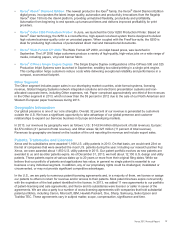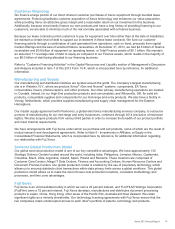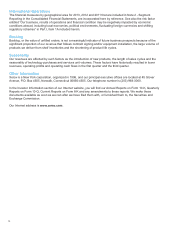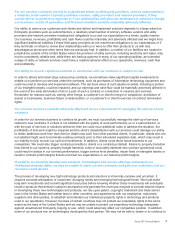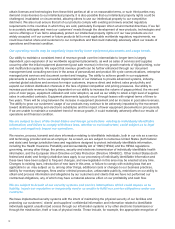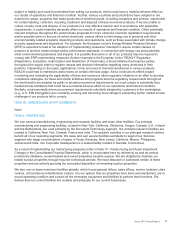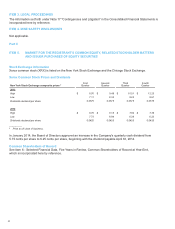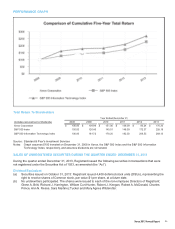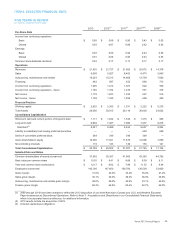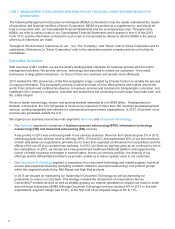Xerox 2013 Annual Report Download - page 34
Download and view the complete annual report
Please find page 34 of the 2013 Xerox annual report below. You can navigate through the pages in the report by either clicking on the pages listed below, or by using the keyword search tool below to find specific information within the annual report.In addition, in order to continually meet the service requirements of our customers, which often includes 24/7
service, and to optimize our employee cost base, we will locate our delivery service centers in lower-cost locations,
including several developing countries. Concentrating our delivery service centers in these locations presents a
number of operational risks, many of which are beyond our control, including the risks of political instability, natural
disasters, safety and security risks, labor disruptions and rising labor rates. These risks could impair our ability to
effectively provide services to our customers and keep our costs aligned to our associated revenues and market
requirements.
Our ability to sustain and improve profit margins is dependent on a number of factors, including our ability to
continue to improve the cost efficiency of our operations through such programs as Lean Six Sigma, the level of
pricing pressures on our services and products, the proportion of high-end as opposed to low-end equipment sales
(product mix), the trend in our post-sale revenue growth and our ability to successfully complete information
technology initiatives. If any of these factors adversely materialize or if we are unable to achieve and maintain
productivity improvements through design efficiency, supplier and manufacturing cost improvements and
information technology initiatives, our ability to offset labor cost inflation, potential materials cost increases and
competitive price pressures would be impaired, all of which could materially adversely affect our results of
operations and financial condition.
Our government contracts are subject to termination rights, audits and investigations, which, if exercised,
could negatively impact our reputation and reduce our ability to compete for new contracts.
A significant portion of our revenues are derived from contracts with U.S. federal, state and local governments and
their agencies, as well as international governments and their agencies. Governments and their agencies may have
the right to terminate many of these contracts at any time without cause. These contracts, upon their expiration or
termination, are typically subject to a bidding process in which Xerox may not be successful. Also, our contracts
with governmental entities are generally subject to the approval of annual appropriations by the United States
Congress or other legislative/governing bodies to fund the expenditures of the governmental entities under those
contracts. Additionally, government contracts are generally subject to audits and investigations by government
agencies. If the government finds that we improperly charged any costs to a contract, the costs are not
reimbursable or, if already reimbursed, the cost must be refunded to the government. If the government discovers
improper or illegal activities or contractual non-compliance in the course of audits or investigations, we may be
subject to various civil and criminal penalties and administrative sanctions, which may include termination of
contracts, forfeiture of profits, suspension of payments, fines and suspensions or debarment from doing business
with the government. Any resulting penalties or sanctions could have a material adverse effect on our business,
financial condition, results of operations and cash flows. Further, the negative publicity that arises from findings in
such audits, investigations or the penalties or sanctions therefore could have an adverse effect on our reputation in
the industry and reduce our ability to compete for new contracts and may also have a material adverse effect on our
business, financial condition, results of operations and cash flow.
Our ability to deliver services could be impaired if we are unable to hire or retain qualified personnel in
certain areas of our business, which could result in decreased revenues or additional costs.
At times, we have experienced difficulties in hiring personnel with the desired levels of training or experience.
Additionally, in regard to the labor-intensive business of the Company, quality service and adequate internal controls
depend on our ability to retain employees and manage personnel turnover. An increase in the employee turnover
rate or our inability to recruit and retain qualified personnel could increase recruiting and training costs and
potentially decrease revenues or decrease our operating effectiveness and productivity. We may not be able to
continue to hire, train and retain a sufficient number of qualified personnel to adequately staff new client projects.
17







